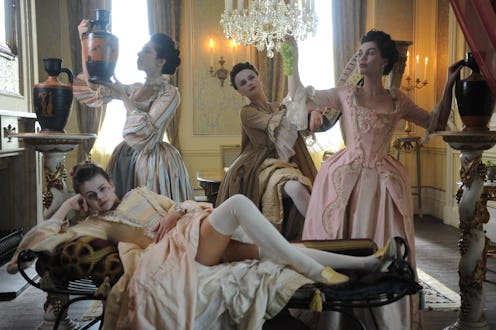
Harlots, a new period drama on Hulu, will remind you of Sophia Coppola's Marie Antoinette by the way it looks and sounds, but also the girl power and the family dynamic of the musical Gypsy. With enterprising female protagonists, Harlots is a feminist show about sex work, which shouldn't be surprising. Perspective matters in a show like this, and the fact that it was written by women is a refreshing and necessary benefit.
The opening sequence of Harlots informs the audience that at that time in London, 1 in 5 women made their living selling sex. It's also clear in the show that the women call the shots. Both Margaret Wells and Lydia Quigley are business owners. Men answer to them. They're doing far more than surviving in a world without women's rights. The all-female creative team also stresses the lack of male gaze on Harlots, and sex scenes that are character and story-based.
As Variety observes, each sex worker's story is different, as well as their attitudes. The best way to combat problematic stereotyping is to show multiple perspectives, which Harlots does in spades. Most of the women, particularly under Margaret's employ, enjoy their job — or at least treat it like a regular, normal job. They're not tragic and full of regret, they're professional. They're funny, and strong, and move about through society rather than existing solely in the shadows. The show even shows men using contraception, which is more than some health classes today would advise.
Of course, not everything about the industry is perfect and happy all the time. Lucy, Margaret's teenage daughter, is clearly not cut out for the gig. She's awkward, and young, and maybe a bit too sincere for a job that requires a lot of pretend and improvisation. The show even dresses her up like Alice in Wonderland to highlight how out of place she seems. She isn't being forced into this job, however, she was born into it.
Meanwhile, when a girl named Betsey tries to better herself by seeking employment with Lydia, she quickly finds herself indentured to this new madam and practically locked up. Plus, while Charlotte Wells is able to enter polite society, she is still technically "kept" by a lord and subject to ridicule.
As Refinery 29 points out, these attitudes about sex workers haven't changed today. That is possibly suggested on Harlots by the use of modern music. Just look at the Starz series The Girlfriend Experience — while being a call girl on that show is safer in some ways, the stigma and lack of security is still there.
So it's awesome that Harlots takes a more positive and female perspective when it comes to the sex industry. Even though the show is set in the past, and has the benefit of hindsight, its feminist angle is relevant today.